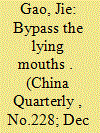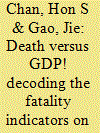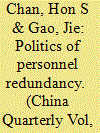| Srl | Item |
| 1 |
ID:
149744


|
|
|
|
|
| Summary/Abstract |
The deliberate distortion of the work accomplishments of local governments is a growing concern for China's leaders in the reform era. How do they tackle this problem and gather reliable data? This study argues that the CCP has developed bypassing strategies to remedy the deficiencies of the statistical system which is vulnerable to artificial data distortion. By employing these strategies, authorities requiring authentic information can directly access the raw data, thereby bypassing lower-level officials who have incentives to distort performance information in the level-by-level reporting process. This study shows that the adoption of bypassing strategies enhances the capacity of the party-state to gather local intelligence. Although the strategies are limited in their ability to ensure the quality of certain types of data, their use should improve the quality of key information on the performance of local governments in the long term.
|
|
|
|
|
|
|
|
|
|
|
|
|
|
|
|
| 2 |
ID:
114856


|
|
|
|
|
| Publication |
2012.
|
| Summary/Abstract |
This article examines how Chinese reformers have used a set of "fatality indicators" to deal with the serious work safety situation in the past two decades. It argues that the system of fatality indicators is a prudent strategy to tackle the responsibility deficiencies in the previous work safety regulatory system and strengthen the central government's supervision over local safety management. The primary purpose of implementing the fatality indicators is to shift local officials' focus from a GDP-centred growth mode to a new mindset of achieving a balance between economic development and social stability in local governance. The article also indicates that the decline in work-related fatalities in recent years is evidence of the effectiveness of the fatality indicators. These achievements aside, however, the introduction of fatality indicators is closely associated with an increase in local officials' dishonest reporting of real death tolls and the fluctuation in very serious accidents.
|
|
|
|
|
|
|
|
|
|
|
|
|
|
|
|
| 3 |
ID:
142567


|
|
|
|
|
| Summary/Abstract |
The implementation of China's reform era target-based cadre evaluation system has instigated various types of gaming behaviour on the part of local officials. How do these gaming strategies differ from each other? Why do local officials sacrifice the public interest for target fulfilment in some cases but not in others? This article argues that gaming is not monolithic and should not be treated as such. It develops a typology that distinguishes between pernicious and benign gaming, and looks into the symptoms and motives of pernicious gaming in particular. It finds that the distinct design of the measurement system – the combination of result-oriented targets imposed from above and high-powered incentives for target fulfilment – induces pernicious gaming. In addition, the system's implementation practically compels local officials to misrepresent their performance, even though they are aware of the negative impact of such behaviour on the public interest. This study shows that to understand the strategies, motivations and implications of gaming better, a more nuanced approach is needed.
|
|
|
|
|
|
|
|
|
|
|
|
|
|
|
|
| 4 |
ID:
161059


|
|
|
|
|
| Summary/Abstract |
This study provides an overview of the origin, importance and strength of the non-leading cadre system and argues that the system plays a key role in building resilience in China's bureaucracy. The non-leading cadre system is administratively and politically important because it makes the party-state bureaucracy more adaptable and fosters cohesion among the elite cadre workforce. Although the system may appear to have institutionalized redundancy, this study argues that this redundancy has the benefit of making movement between leading and non-leading cadre status possible. In other words, the non-leading cadre system provides the various levels of the party-state bureaucracy with the leverage to develop their own measures for resolving their own problems. Putting aside the deficiencies in implementation, the non-leading cadre system is likely to remain durable and will help to develop an agile and resilient personnel management system, at least in the short to medium term.
|
|
|
|
|
|
|
|
|
|
|
|
|
|
|
|